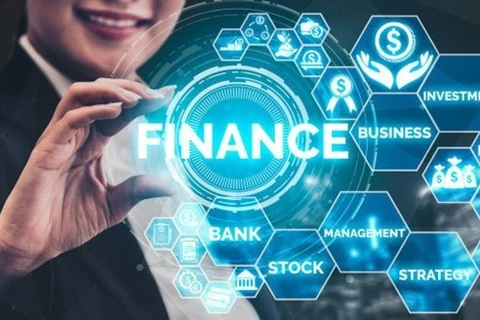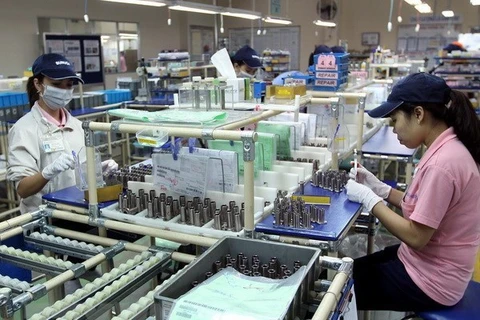Hanoi (VNA) – The Business Registration Agency under the Ministry of Planning and Investment has released a report assessing Vietnamese enterprises’ responsiveness to the COVID-19 pandemic, and proposed some measures for improving their adaptability to crises.
The pandemic has greatly affected production and business activities at Vietnamese enterprises, forcing many to suspend operations and even pushing them to the brink of bankruptcy, Director of the agency Bui Anh Tuan told the report launch held with support from the Aus4Reform programme on November 9.
The majority of Vietnamese firms are small- and medium-sized enterprises (SMEs) and being relatively new, they often lack resources and experience in responding to crises with large-scale and long impacts such as the COVID-19 pandemic.
Global political and economic situations have also witnessed complex and unpredictable developments recently, causing new risks and challenges to the recovery and development of economies, including Vietnam, Tuan noted.
Given this, enterprises should plan their response to risks, uncertainties and crises to develop sustainably and enhance their immunity against crises, and also strengthen the economy’s resilience, he added.
Nguyen Thi Viet Anh, Deputy Director of the agency, said since the pandemic’s impacts have varied among sectors, there isn’t a common formula for all businesses to follow.
However, they will need to pay more attention to boosting their resilience to unfavourable conditions and unexpected risks by building response plans and making more intensive and extensive consideration of macro-impacts, instead of just focusing on micro-factors as in the past.
The research group and experts also said that owners and managers of enterprises should raise their awareness of the importance of risk governance and form short-, medium- and long-term plans.
They recommended the Government, ministries, sectors, and localities fine-tune policies and laws; step up administrative reforms; assist firms to conduct digital transformation, apply science and technology, and optimise chances created by the Fourth Industrial Revolution; and train high-quality human resources to help businesses boost their responsiveness to crises./.
The pandemic has greatly affected production and business activities at Vietnamese enterprises, forcing many to suspend operations and even pushing them to the brink of bankruptcy, Director of the agency Bui Anh Tuan told the report launch held with support from the Aus4Reform programme on November 9.
The majority of Vietnamese firms are small- and medium-sized enterprises (SMEs) and being relatively new, they often lack resources and experience in responding to crises with large-scale and long impacts such as the COVID-19 pandemic.
Global political and economic situations have also witnessed complex and unpredictable developments recently, causing new risks and challenges to the recovery and development of economies, including Vietnam, Tuan noted.
Given this, enterprises should plan their response to risks, uncertainties and crises to develop sustainably and enhance their immunity against crises, and also strengthen the economy’s resilience, he added.
Nguyen Thi Viet Anh, Deputy Director of the agency, said since the pandemic’s impacts have varied among sectors, there isn’t a common formula for all businesses to follow.
However, they will need to pay more attention to boosting their resilience to unfavourable conditions and unexpected risks by building response plans and making more intensive and extensive consideration of macro-impacts, instead of just focusing on micro-factors as in the past.
The research group and experts also said that owners and managers of enterprises should raise their awareness of the importance of risk governance and form short-, medium- and long-term plans.
They recommended the Government, ministries, sectors, and localities fine-tune policies and laws; step up administrative reforms; assist firms to conduct digital transformation, apply science and technology, and optimise chances created by the Fourth Industrial Revolution; and train high-quality human resources to help businesses boost their responsiveness to crises./.
VNA

























